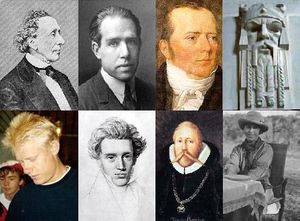Danes
 |
||||||||||||||||||||||||||||||||||||||||||
| H. C. Andersen • Niels Bohr • H. C. Ørsted • Sweyn Forkbeard Peter Schmeichel • Søren Kierkegaard • Tycho Brahe • Karen Blixen |
||||||||||||||||||||||||||||||||||||||||||
| Total population | ||||||||||||||||||||||||||||||||||||||||||
|---|---|---|---|---|---|---|---|---|---|---|---|---|---|---|---|---|---|---|---|---|---|---|---|---|---|---|---|---|---|---|---|---|---|---|---|---|---|---|---|---|---|---|
| c. 8 million | ||||||||||||||||||||||||||||||||||||||||||
| Regions with significant populations | ||||||||||||||||||||||||||||||||||||||||||
|
||||||||||||||||||||||||||||||||||||||||||
| Languages | ||||||||||||||||||||||||||||||||||||||||||
|
Danish |
||||||||||||||||||||||||||||||||||||||||||
| Religion | ||||||||||||||||||||||||||||||||||||||||||
|
Predominantly Lutheran; |
||||||||||||||||||||||||||||||||||||||||||
| Related ethnic groups | ||||||||||||||||||||||||||||||||||||||||||
|
Dutch, Frisian people, English. |
Danish people or Danes are a nation and ethnic group native to Denmark, who speak Danish. This includes people with a Danish ancestral or ethnic identity, whether living in Denmark, emigrants, or the descendants of emigrants, e.g.: the Danish ethnic minority in Southern Schleswig, a former Danish province. The Danes, as an ethnic group, is part of the larger ethnic group known as Scandinavians.
Contents |
Origins
The current Danes are descended from an ancient North Germanic tribe originating and residing in Scania and on the Danish islands, Danes (Dani) of e.g. Beowulf.
Several other ethnic components exist in what is today the Kingdom of Denmark. The modern peoples of Jutland descend from the Jutes from Jutland, and their proto-Jutish ancestral tribes, including the Cimbri, who resided in Jutland.
The Dani were not mentioned by Tacitus, whose famous work Germania mentions the Gothones (Geats and/or Goths?). They seem to be, however, mentioned by Jordanes and Procopius, as the Dani. The name Dani is the etymological root of Dane.
Jordanes maintains that the Dani were of the same stock as the Suetidi (Swedes, Suithiod?) and expelled the Heruli and took their lands. If Tacitus simply did not overlook the Dani, and if Jordanes's information was correct, it is possible that they first appeared, as an off-shoot of the Swedes, sometime in the 2nd or 3rd century A.D.
There are several different legendary accounts of the foundation of Denmark. One of the legendary accounts found in the Chronicle of Lejre tells that a ruler of Zealand with name Dan had raised an army and saved his people from an invasion by the Roman Emperor Augustus Caesar, that the Jutes, the men of Funen and the Scanian Provinces also accepted him as king, whence the resultant expanded country of Denmark and the Danes were named after him.
Dan as one or more ancient kings of the Danes are also written in other Nordic sagas.
Danes in Denmark
Five million ethnic Danes live in Denmark today.[1] A minority of approx. 50,000 Danes live in Southern Schleswig in Germany, a former Danish territory, forming around 10% of the local population. In Denmark, the latter group is often referred to as De danske syd for grænsen (Literally: The Danish south of the border) or sydslesvigere (South Schleswigers).
The Danish nation in a political context
Det danske folk (The Danish people) as a concept, played an important role in 19th century ethnic nationalism and refers to self-identification rather than a legal status. Use of the term is most often restricted to a historical context; the historic German-Danish struggle regarding the status of the Duchy of Schleswig vis-à-vis a Danish nation-state. It describes people of Danish nationality, both in Denmark and elsewhere. Most importantly, ethnic Danes in both Denmark proper and the former Danish Duchy of Schleswig. Excluded from this definition are people from the formerly Norwegian Faroe Islands and Greenland as well as members of the German minority as well as members of other ethnic minorities.
The term should not be confused with the legal concept of nationality, danske statsborgere (Danish nationals) i.e. individuals holding Danish citizenship.
See also
- List of Danes
- Danish Americans
- Scylding
- Danelaw
- Viking Age
- Uí Ímair
- Kingdom of York
- Kingdom of Dublin
- Culture of Denmark
References
- ↑ 1.0 1.1 Danmarks Statistik (pdf, written in English) reports that Denmark, per 1 July 2009, has 483,390 inhabitants of foreign inheritance out of 5,451,826 total inhabitants. That amounts to an estimate of 4,987,656 ethnic Danish people in 1 July 2009. The number of holders of Danish citizenship (disregarding ethnic background) was 5,167,996 at the same date.
- ↑ The 2000 American census reports that the United States, in the 2000 census, has 1,430,897 inhabitants of Danish ancestry.
- ↑ Statistics Canada
- ↑ Statistics Norway. "Persons with immigrant background by immigration category, country background and sex. 1 January 2009 (Immigrants and Norwegian-norn to immigrant parents + Other immigrant background)". http://www.ssb.no/english/subjects/02/01/10/innvbef_en/tab-2009-04-30-05-en.html. Retrieved 2009-08-27.
- ↑ Australian Bureau of Statistics 2006 Census Table
- ↑ National minorities at the Federal Foreign Office of Germany
- ↑ Statistics Sweden
- ↑ Danish Immigrants to the UK (2001)
- ↑ Spanish National Statistics Institute
- ↑ [1]
- ↑ Statistics New Zealand
- ↑ CSO Ireland - 2006 Census